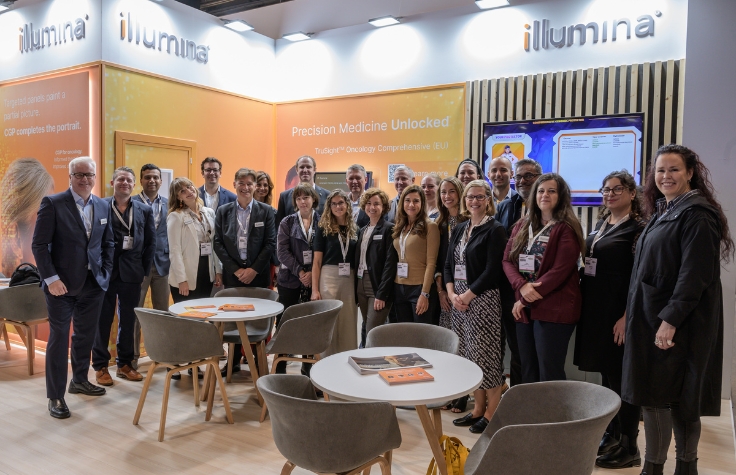
October 23, 2023
The European Society of Medical Oncology (ESMO) annual congress has just wrapped up in Madrid, where Illumina met with oncologists, patient advisory groups, and pharmaceutical companies to highlight the clinical value of homologous recombination deficiency (HRD) testing through comprehensive genomic profiling (CGP). HRD testing is a transformative approach that promises to revolutionize cancer therapy selection by examining genetic aberrations crucial in the management of patients with diverse malignancies. As part of our joint symposium with Myriad Genetics, our distinguished faculty, along with leading experts in this field, focused on the detection and the role of HRD testing and its impact on patient management.
Watch our video highlights from the congress below:
If you are interested in learning more about Illumina-involved studies, check out these abstracts presented at ESMO 2023:
Illumina presented two abstracts as part of the IMPRESS-Norway study, which discusses the implementation of CGP in Norway’s public health care system, with a focus on improving cancer treatment opportunities through advanced diagnostics.
The first poster illustrates the progress of InPreD, a collaborative network of hospitals across the country that was formed in 2020 to build the infrastructure needed to standardize CGP testing nationwide. The program includes the establishment of a national virtual tumor board for patients eligible for experimental cancer treatment and clinical trials. A total of 1000 patients received CGP testing, which resulted in new treatment options for 34% of them and 21% being referred to the national precision medicine IMPRESS-Norway clinical trial.
The second poster shows that rare cancer patients represented about half of the 836 patients screened in the first two years of the IMPRESS-Norway trial. Few approved treatments exist for patients with rare cancers. In this study, CGP identified actionable molecular alterations matching one of the drugs available in the trial for 20% of patients with rare cancers. Clinical benefit at 16 weeks, the primary endpoint of this study, was observed in half of these patients.
Illumina presented a third poster highlighting findings from a real-world evidence study assessing the impact of CGP on treatment selection and overall survival in patients with advanced non-small-cell lung cancer compared to single-gene testing and small panels. In this study, conducted in collaboration with the software company Syapse, patients who received CGP had higher use of matched precision therapies and greater real-world overall survival compared to patients receiving single-gene or small-panel testing. Broader adoption of CGP may improve the detection of actionable biomarkers and increase the use of appropriate matched therapies, resulting in better outcomes.
In a fourth poster, Hartwig Medical Foundation presented preliminary results of whole-genome sequencing testing in adolescents and young adults with cancer, a population underrepresented in clinical trials and for whom treatment options are limited. To shed light into the characteristics of this population, the authors presented preliminary findings of close to 200 patients in their database. The results show an overrepresentation of gastrointestinal and bone or soft tissue cancers in this population compared to the Dutch national database and similar driver alterations to those found in non-adolescent or young adult patients.
Finally, the Netherlands Cancer Institute presented preliminary results of two years of implementation of whole-genome sequencing (WGS) as standard-of-care diagnostics for metastatic cancers, rare primary tumors, and cancers of unknown primary. WGS results were obtained in 93% of over 800 patients included in the study, proving the feasibility of WGS in routine clinical care. Successful WGS testing led to clinically relevant information for 77% of the patients.


